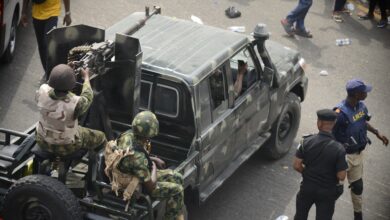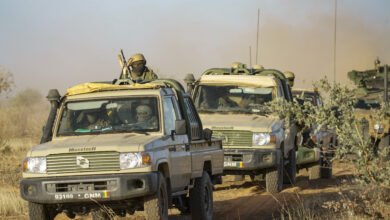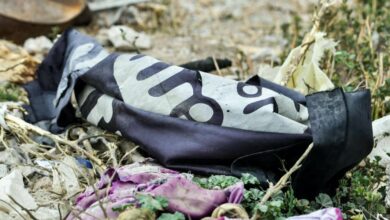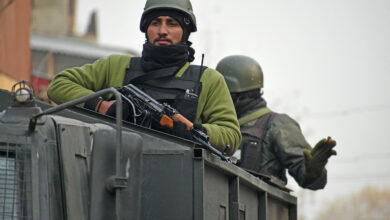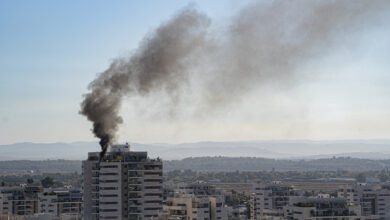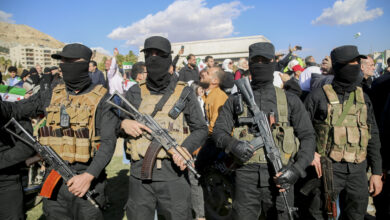Iran Police Station Attack Leaves Two Officers, Four Gunmen Dead
Two policemen were killed Saturday in Iran’s restive southeast near Pakistan, Iranian media said, in an attack claimed by jihadists that left four assailants dead.
The grenade attack and ensuing firefight at a police station was the latest violence to hit Sistan-Baluchistan province, where unrest has involved drug smuggling gangs, rebels from the Baluchi minority, and Sunni Muslim extremist groups.
Also on Saturday, the Islamic Republic’s judiciary said two men were hanged in public over a deadly shooting last year at a revered shrine in the southern city of Shiraz.
In Zahedan, the Sistan-Baluchistan provincial capital, “four unidentified armed individuals attacked and entered police station Number 16,” state broadcaster IRIB reported, citing the province’s deputy head of security Alireza Marhamati.
The attackers used grenades to blast open the gates of the police station, and an exchange of fire occurred, said Marhamati.
The jihadist Jaish al-Adl group, which was formed in 2012 and is blacklisted by Iran as a “terrorist” group, claimed responsibility, SITE Intelligence Group reported.
Tasnim news agency, quoting Sistan-Baluchistan police chief Doustali Jalilian, said two officers were killed in the clash.
All four “terrorists” involved were killed, according to Iran’s official news agency IRNA, quoting an Islamic Revolutionary Guard Corps branch that commands southeast Iran.
September Unrest
The targeted police station is located near Zahedan’s Makki Mosque, where last year thousands protested following the alleged rape of a teenage girl in custody in the port city of Chabahar.
In its statement reported by SITE, Jaish al-Adl accused security forces of targeting protesters during the September rallies, during which dozens of people including security forces were killed.
Cleric Molavi Abdol Hamid, the head of Makki Mosque and an influential leader of Sistan-Baluchistan’s Sunni minority, denounced the attack on police.
“We insist on maintaining the … security of the country,” Abdol Hamid said in a statement.
The September clashes in Zahedan came as Iran was gripped by nationwide protests following the death in custody of 22-year-old Mahsa Amini, arrested for an alleged breach of strict dress rules for women.
Several weeks into the unrest, on October 26, a mass shooting at the Shiite Muslim shrine of Shah Cheragh in Shiraz left 13 people dead and 30 wounded.
The attack was later claimed by the Islamic State (IS) group.
Iran on Saturday executed two men over the attack, the judiciary’s Mizan Online website said.
The pair were hanged at dawn on a street near the shrine in Shiraz, the capital of Fars province, IRNA reported.
Mizan identified them as Mohammad Ramez Rashidi and Naeem Hashem Qatali, but did not reveal their nationalities.
Iran had previously said the attack involved people from other countries including neighboring Afghanistan.
According to Mizan, Rashidi had confessed to having collaborated with IS to carry out the shooting.
The two were sentenced to death in March after convictions of “corruption on earth, armed rebellion, and acting against national security”, as well as “conspiracy against the security of the country.”
https://twitter.com/wahidhaidari95/status/1677610069561864192
Rare Public Hangings
Fars chief justice Kazem Moussavi said at the time Rashidi and Qatali had been directly involved in the “arming, procurement, logistics and guidance” of the main perpetrator.
Three other defendants in the case were sentenced to prison for five, 15, and 25 years for being members of IS, Moussavi said.
The main assailant — who Iranian media later identified as Hamed Badakhshan, a man in his 30s — died of injuries suffered during his arrest, the authorities said.
In November, the Islamic Republic said 26 “takfiri terrorists” from Afghanistan, Azerbaijan, and Tajikistan had been arrested in connection with the attack.
In Shiite-dominated Iran, the term takfiri generally refers to jihadists or proponents of radical Sunni Islam.
Public executions are relatively rare in Iran with almost all hangings carried out inside prisons.
Iran executes more people annually than any nation other than China, according to rights groups including the London-based Amnesty International.
The pace of the executions has been relatively rapid in 2023, with the Norway-based group Iran Human Rights reporting nearly 370 executions since the start of the year.
A United Nations fact-finding mission said this week Iran had executed seven men in connection with the Amini protests, calling on Tehran to stop the “chilling” practice.





